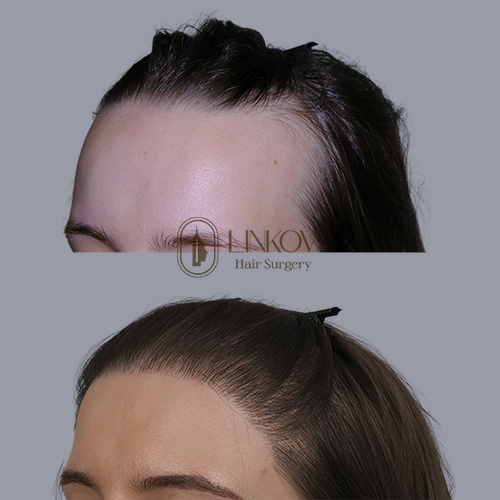NYC Female Hair Loss Treatment (Female Pattern Baldness)
Hair loss in women can be embarrassing and confusing. You expect to see balding areas and overall hair loss in men, but not in women. In fact, female pattern hair loss is common. And at Linkov Hair Surgery in New York City, a leading hair loss specialist offers a wealth of options to either transplant healthy, growing hair in spotty bald patches or find another procedure to restore your hair. Call the experts because you may have an underlying medical condition. Maybe you’ve been practicing damaging hairstyling that just needs to be treated or reversed to end your hair loss cycle. You won’t know unless you talk to an expert.

What Is Female Pattern Hair Loss?
While you may have heard of male pattern baldness, you may not have heard of female pattern hair loss, since it’s not as common. Similar to its male counterpart, this type of hair loss occurs in women and is most likely due to an overproduction of male hormones, which is a genetic condition.With this condition, hair follicles shrink and produce weaker, thinner hairs that fall out more easily. You see signs of early female baldness if your center part starts to widen. Hair begins thinning mostly on the top of the crown area of your scalp. In women, these balding patterns technically are known as androgenetic alopecia and can be identified and treated best if caught early.
For the best diagnosis and treatment of female pattern hair loss, rely on the best hair restoration doctor at Linkov Hair Surgery in Manhattan. Once diagnosed, you have a wealth of options, ranging from permanent solutions like hair transplants to temporary fixes such as natural-looking wigs.

SCHEDULE CONSULTATION
(212) 970-9404
What Causes Women to Lose Their Hair?
Female pattern hair loss can be attributed to a few different sources. It can be a genetic trait, but also can be caused by outside circumstances or as the result of different hormonal medications. If you notice a rapid thinning or loss of hair, a top NYC doctor figures out what may be the cause through a series of exams that include your medical history, lifestyle questions and blood tests to rule out an underlying medical condition.For many women, gradual hair loss is simply a natural part of getting older. It may be due to a vitamin deficiency or a change in diet. Linkov Hair Surgery offers treatments for most types of hair loss. Consult an experienced surgeon if you’re experiencing hair loss caused by:
- Aging Your hair loss may be due to the natural process of aging, especially with a vitamin deficiency, or your follicles may just be too old to produce new hair.
- Androgen production Androgens are hormones in the female body that act like male hormones, shrinking the size of hair follicles so that it’s harder for new hair to grow strong.
- Family history This type of hair loss could be genetic if experienced by other women in your family.

What Are the Different Types of Female Pattern Hair Loss?
Unlike male pattern baldness, the genetic trait in women seems to appear in more than just one pattern. Clinicians at Harvard University have classified these types or stages using the Ludwig System, a classification system in place to determine the extent of female pattern baldness. This system classifies the level of severity of hair loss to find the best treatment plan possible.According to this system, there are three levels of female pattern baldness, each with its own characteristics and treatment options. The surgeons at Linkov Hair Surgery identify your stage of hair loss and develop a treatment plan for each stage that includes:Type I
Thinning begins around your crown and around your center part. You may not even notice this type, and you can cover it by restyling or changing the part of your hair.
Type II
Noticeable balding on areas of the scalp appear, as well as further thinning and balding of your crown. Your hair may shed more rapidly and become harder to style over.
Type III
The most severe stage of hair loss, this type causes noticeable hair loss over most of your crown. Patchy areas may widen. With this type of hair loss, medication is most likely recommended, although surgical hair transplant options come into play.
What Treatments Are Available for Female Pattern Baldness?
There’s no prevention known for female pattern baldness, but there are many different paths to treatment. Depending on the severity of hair loss and the conditions contributing to it, your hair restoration professional finds a treatment that works best for you and your lifestyle. Top tier, celebrity-trusted surgeons are available to help you decide on the best treatment plan to achieve your goals.Some topical over-the-counter treatments may be an option for both men and women, but the strength and amount applied may differ. The most common types of treatment for female pattern hair loss include:Minoxidil
With this topical medicine, the two percent solution or five percent foam is recommended for women specifically. Women are advised to use it continually, as the hair loss may start up again if you stop.
Other medicines
If the minoxidil hasn’t produced any successful results, your Manhattan doctor may recommend other medications, such as spironolactone, cimetidine or ketoconazole.
Hair transplants
Hair transplants have evolved to become a common treatment for many people. The follicular unit extraction and follicular unit transplantation procedures are catered to your specific hair loss predicament as a woman. They can soften your hairline and add hair to thinning areas to create a thick head of hair.
Birth control
In some cases, hormonal birth control may be a solution to your thinning hair. Added hormones encourage weakened follicles to regrow hair and can shorten the follicle growth cycle so that hair is produced more frequently.
What’s the Prognosis for Female Pattern Hair Loss?
If your doctor has determined your hair loss is simply pattern hair loss, it’s usually not a sign of an underlying illness. However, the hair loss is likely permanent and can affect your self-esteem and cause unwanted anxiety.
Luckily, there are many treatment options available, and the doctors at Linkov Hair Surgery make sure you find the best solution that works for you. Contact a top surgeon at Linkov Hair Surgery today for a consultation.
Linkov Hair Surgery
150 E 56th St, #1A
New York, NY 10022
(212) 970-9404

